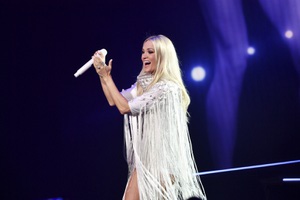This summer, Counting Crows are embarking on a 25th-anniversary tour. Don’t expect the jam-folk band to make too much of a fuss about the milestone, however. Frontman Adam Duritz tells the Weekly it’ll be business as usual from a setlist perspective—the band will have 80-plus songs worked up from its catalog, from 1993’s T Bone Burnett-produced blockbuster August and Everything After through its most recent album, 2014’s Somewhere Under Wonderland He also spoke about career longevity, his podcast and the new artists he's digging.
As you look back, what have been the most gratifying and unexpected things that being in the band, and having so many hits you've had, has allowed you all to do? Playing music all this time, I suppose. Because even though it is what you imagined, after you've done it for a little while, and you see the other bands and how it works out for everyone, you realize how rare it is to actually get to spend your life doing this.
I mean, I've spent my entire adult life doing this pretty much. Half my life, really. It's pretty crazy. I mean, it is what I imagined, but I know that it's just the fraction of a fraction of a fraction of a fraction of artists for whom this sort of thing works out. It's so small; it's like an imaginary number, you know? I think that's probably the most incredible part of it.
It's true. You've been at a certain level for a long period of time, which is also very rare. We always tried to think in terms of things that would work for us for the long run, as opposed to the short run. We really tried to think about the future and each other and what the best ways to stay together [are] and how to do things that were important artistically for us. And even when they didn't really agree with what the record company or the business wanted—you know, when you sell 10 million records with a record you make with T Bone Burnett, they don't want you to go find the guy that made the Pixies records [Gil Norton] to do your next record [1996's Recovering The Satellites]. That's pretty frowned upon.
And when that's a No. 1 record, they don't want you to go find the guy that did Sparklehorse [Cracker's David Lowery] under a pseudonym] to do the next one [1999's This Desert Life]. But we were more interested following things that we were passionate about. We thought we'd always do better work if we were passionate about it, as opposed to if it was the right commercial decision. Maybe that lost us some things here and there commercially, but I think it did really pan out in the long run. I'm pretty proud of all the work, and I don't have anything I'm really ashamed of, which is good.
You talk to artists and they're like, "Yeah, we put out a record, and I didn't like the direction," or "The record company forced us into doing something." It's pretty nice to be able to look back and say, "I'm proud of everything we've done." Yeah. I feel that way about it. I mean, we lived for a long time in a constant state of war with the record company, but it worked out.
You mentioned working with Gil Norton, and I think Recovering The Satellites is a real fan favorite. What was it like working with him? It was great. For me, it was amazing. I felt like [August And Everything After]…I love that record, but we did the best we could do. We couldn't really play other kinds of music yet. We were just learning to play together. But we had all kinds of ambitions about the kind of things we wanted to do that were really different from that. And on the second record, we really stretched out to try and do all those things.
We always looked for producers who could take us in the areas we really wanted to go into, but we didn't necessarily know how to do by ourselves. I think that we had really great collaborations throughout our whole career that way. But Gil—Gil's a gem. He's one of my favorite people on earth. I love him.
It's cool when you find someone you really jibe with, and that you're on the same wavelength with. Some producers want to put their own imprint on [a band], but when a producer is trying to bring the best out of a band—fans can tell, and those are the records that I like, too. We've been lucky with that, I think, with everyone we've worked with. For the most part [we've] had great experiences with different producers. I mean, on [2008's] Saturday Nights [& Sunday Mornings] we worked with Gil again, and we worked with Brian Deck for the first time—and we've worked with Brian again since then, and it's been fantastic
What's been the most gratifying thing for you doing your Underwater Sunshine podcast? Well, it's kind of like every music geek's dream. You sit around with your friends and talk about music you like all the time, and you have these great discussions, but nothing comes of it. And the great thing about starting your own podcast is now it lives on forever. I mean, it's just the sort of thing me and my friends just do anyway, but James [Campion, co-host] and I get to have it…like, it immortalizes it, which I think it's pretty fun. Like all of us, we just love talking about music, and shoving the music we love down each other's throats. [Laughs.] All my life, my best friends have introduced me to great music. It's been the best thing about our friendships in some ways.
Are you potentially working on a memoir too with James? Kinda, yeah. We started off doing that. We had done a bunch of interviews together, cause he's a journalist as well. He commented to me one time that over the course of our many interviews, he had way too much material to ever use. And he said, "We should write a book." This was like 10 years ago. We talked about it over the years, and then finally we decided to do it about a year-and-a-half or two years ago. And we would meet every Friday, or once a week in any case, and we would talk for four or five hours and record it.
And the funny thing is after about a year of that, I had the same thought about the book that he had about the articles. I called him up and I said, "You know, there's way more material in these talks than we're ever going to use in the book. We should do a podcast. We can still do the book; it doesn't interfere with it at all. But why not do a podcast as well? It's the same time; why not focus it?" They kind of led into each other. So we're still doing both. I mean, I don't know if it's a memoir so much—it's kind of like the podcast: a series of discussions about life, our lives and music and stories.
Do you have any particular memorable Las Vegas gigs that stand out to you? There was one [in 2013] where a storm tore the roof off the gig at the [Mandalay Bay Beach] pool where we were playing. We had to cancel that one. We've played so many shows in Vegas over the years, I'm tried to think of a particular one. I just enjoy being there.
And I'm not there very often. I think on one of my first trips to Vegas with the band—I'd never been to Vegas before—and after the first couple of trips, I was enjoying myself so much, and it suddenly occurred to me that it was incredibly dangerous to be enjoying Las Vegas that much. I had this vision of homelessness and bankruptcy, and I made a decision right then and there that I would enjoy myself immensely every time I went to Vegas with the band—and I would never set foot there unless I was there for work. And other than one occasion when Cal [Berkeley], where I went to college, was playing a bowl game in Vegas, I've never been back to Vegas except for gigs since then. I've had a great time in Vegas over the years, but I made a vow to myself, and I stuck to it.
Are you planning on any new Counting Crows music after this tour? Yeah, I think so. I've been holding off on it, because I really thought it was important to figure out how we really want to put out music from now on. I thought we needed to take a second and try and do a little more research into that. But I think we'll go in the studio again soon.
It is so different now from when you guys put out your first record 25 years ago. It's a completely different, foreign landscape. Yeah, and we're running an independent company, too, so we really need to make sure we've got all our bases covered.
And it feels like bands now to have to be more involved in the business side of things, to manage their careers. For some of them, it's very shocking. It's very difficult to try to figure out stuff they didn't have to worry about 20 years ago. Well, I think you probably were always better off worrying about it. The idea of trusting a record company to take care of stuff for you is like asking a stream full of piranhas to hold your lunch. It was always better to be involved.
What are you looking forward to most on this summer's tour? Is there anything in particular? I would tell everybody to come out early... Boom Forest, the first band on the bill, is fantastic. They're playing our festival, the Underwater Sunshine Festival, this year [in October], and they played the Outlaw Road Show several times before. They're a band from Wisconsin and they're just brilliant. Their singer, JP Roney, is such a great singer and writer [and] brilliant musician. I'm going to get there early to watch them every night.
COUNTING CROWS July 14, 7:30 p.m., $51-$201. The Joint, 702-693-5222.







